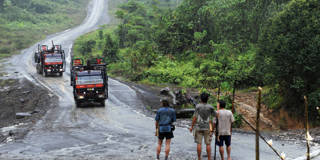The world is not wanting for powerful technologies, funding, talent, or knowhow. The fact that these factors are not driving rapid progress toward the Sustainable Development Goals is a failure of governance – in particular, the absence of appropriate market structures and incentives.
HONG KONG – Southeast Asia’s Malay Archipelago is very far away from Ukraine, and the indigenous people of Borneo – living in some of the most pristine jungles left in the world – do not leave much of a carbon footprint. Yet even they cannot escape the effects of war, inflation, and climate change. And one of our best hopes of building a better world – the United Nations Sustainable Development Goals – is looking increasingly unattainable.

HONG KONG – Southeast Asia’s Malay Archipelago is very far away from Ukraine, and the indigenous people of Borneo – living in some of the most pristine jungles left in the world – do not leave much of a carbon footprint. Yet even they cannot escape the effects of war, inflation, and climate change. And one of our best hopes of building a better world – the United Nations Sustainable Development Goals – is looking increasingly unattainable.